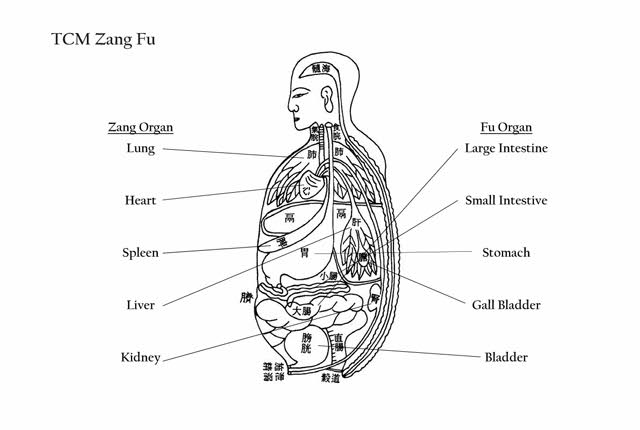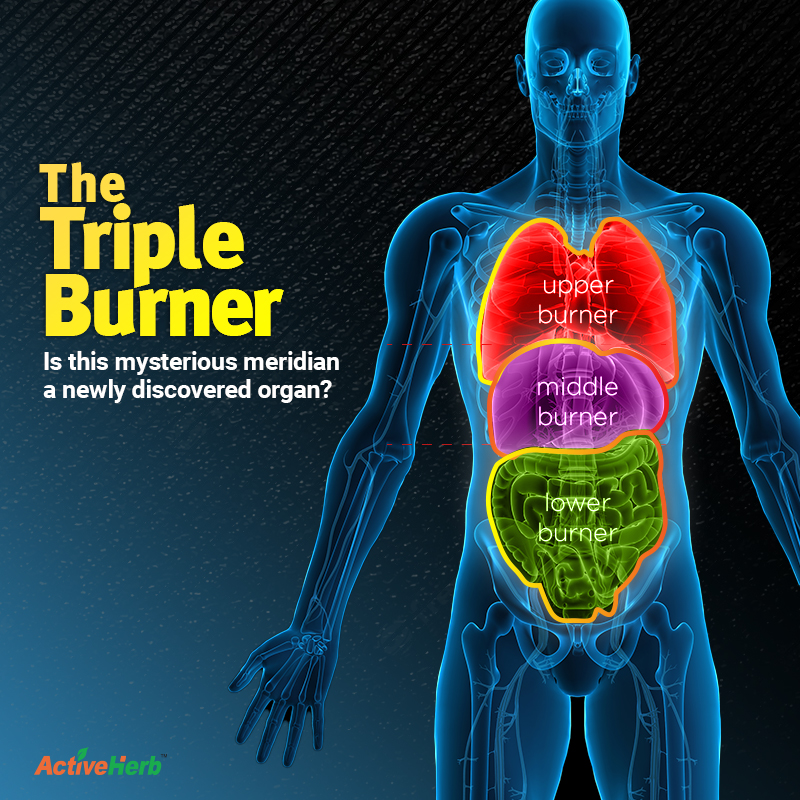Zang Fu Organ Theory: The Yin/Yang of Your Internal Body

One of the most fascinating aspects of traditional Chinese medicine (TCM) is zang fu organ theory.
You can think of zang fu organ theory as a philosophy of human physiology that’s at least 2,000 years old.
Zang fu organs differ from western anatomical organs
When most people hear the word “organ,” there’s a connotation of a fixed anatomical structure. “The liver,” for example. However, in TCM, the organs aren’t really an anatomical feature. In fact, zang fu organ theory is really more of an abstract concept. And this concept often has little to do with the organs associated with western anatomy and physiology. That’s why you’ll see references to organs in TCM capitalized. This is to distinguish TCM organs from the western concept of organs.
As an example, let’s distinguish between Spleen in TCM and “the” spleen in western anatomy. Spleen in TCM is chiefly responsible for digestion. Whereas the spleen of western medicine has a primary role of filtering blood for the immune system.
To be sure, there is some crossover between TCM zang fu organ functionality and western anatomical organ physiology. But Zang fu theory is more holistic than western organ physiology. There’s much more of an emphasis in TCM on how the organs interact with each other. Not to say that zang fu organ theory is superior (or inferior) to western organ physiology; the distinction here is that the two ways of identifying what the organs do are, at times, radically different.
What is Zang Fu Organ Theory?
There are six zang organs and six fu organs. Zang fu organ theory is essentially the Yin-Yang, holistic, interconnected relationship of the organs.
Because the ancient sages of TCM did not, as a routine practice, dissect or conduct invasive internal surgical procedures, the protocol of zang fu organ theory was used as a way of explaining how external signs (a pale face, for example) reveals what’s going on internally (Spleen Qi deficiency, for example).
In short, zang fu organ theory can be summed up as such: the human body is a holistic, integrated microcosm of the universe. And all its tissues and structures are organically connected.
What are the Zang Fu Organs?
According to zang fu organ theory, each organ in TCM has a corresponding meridian. And each zang organ has a corresponding fu organ, and vice versa.
The Yin-Yang pairing of the zang fu organs are (zang organs are listed first):
- Lung/Large Intestine
- Spleen/Stomach
- Liver/Gallbladder
- Heart/Small Intestine
- Kidney/Bladder
- Pericardium/Triple Burner
What do zang organs do?
The attributes of the zang organs are they constitute yin energy; they govern physical and mental regulation of the body; and they act on the interior meridians. Moreover, the zang organs store the essence. This means that they are a reservoir for Qi energy, blood and body fluids.
What do fu organs do?
The fu organs possess Yang energy and influence the exterior of the body. They are involved in the transformation and disposal of food and waste.
Zang Organs in Detail
TCM practitioners often diagnose deficiencies or excesses most often in the Zang organs.
Lung, in TCM, is one of the six zang organs. Lung, according to TCM theory, has a similar physiological action as its western organ counterpart. In TCM, Lung, takes Qi from the air. And it’s responsible for the overall state of Qi in the body. This zang organ is perhaps the one that is most vulnerable to attack by one of the Six Evils, which can cause illness or disease (i.e. heat, damp, cold, wind).
As mentioned, the next zang organ, Spleen, differs in physiology from western anatomical spleen. According to TCM theory, Spleen is the principal organ of digestion. It transforms food into nutrients. Then, it transports said nutrients. Moreover, Spleen also regulates blood. People who are chronically tired may very well have Spleen Qi deficiency.
And as for the Liver, it regulates Qi and stores blood. Blood, in turn, carries qi around the body to support all the zang fu organs, as well as the body’s tissues.
The next zang organ is Heart. Here’s another TCM organ that shares a physiological duty with its western organ counterpart. Heart moves blood through the vessels. But Heart also performs esoteric functions. It stores the spirit (Shen, in TCM). In addition, Heart is the seat of mental acuity.
Kidney governs growth, development and reproduction, and is the seat of the essence (known in TCM as Jing, the inherited life force critical for health and vitality). Diseases related to aging are often indicators of chronic Kidney Qi deficiency. Kidney Yin Deficiency can also present externally as lower back or knee pain, dizziness, constipation, thirst, night sweats, premature ejaculation and vaginal dryness.
Diagnostic patterns and zang fu organ pathology
(The sixth zang organ, pericardium, isn’t as emphasized for diagnostics as much as the other five zang organs and therefore will not be discussed.)
Each zang fu organ system can have excess Qi or deficient Qi. Excess patterns include cold, which is a sign of excess yin, while heat is excess yang, whereas deficiency patterns include Qi, Yin, Yang, or Blood deficiency.
Let’s look at some examples of diagnostic patterns using zang fu organ theory. If someone has a persistent cough, chest pain, shortness of breath, or chronic fatigue, these external conditions offer the TCM practitioner a window into the inner pathology of the patient. With these clues, the patient likely has Lung Qi deficiency, which manifests as well by daytime sweating, weakness in voice, a weak immune system and a swollen tongue with thin white coating. Skin problems such as eczema might also be an indication of Lung Qi deficiency, as Lung is associated with skin.
Zang fu theory may be used to diagnose someone as Spleen Qi deficient if they have poor appetite, a pale face, weak limbs, loose stools, gas, bloating, or other chronic digestive problems.
As for Liver Qi stagnation, along with Spleen Qi deficiency, this may be the most common diagnosis among people in the U.S. Liver Qi deficiency worsens with stress. Because Liver is the seat of emotions, Liver Qi stagnation can manifest as depression, anxiety or irritability. Other signs of Liver Qi stagnation are pain, frequent sighing, and abnormal menstruation.
Traditional Chinese Medicine Zang Fu Organ Times
There are 12 major meridians in TCM theory. And each of the dozen meridians has a corresponding zang fu organs. Each of the zang fu organs is most active and dominant during a two-hour window during the day. Using the Liver as an example, it is most active between 1-3 a.m. If you chronically wake up during the hours of 1-3 a.m., this is indicative of Liver Qi stagnation.
Zang Fu Organ Theory: Conclusion
Zang fu organ theory differs from western anatomy and physiology. Western medicine tends to isolate organs with singular, specific functions. However, TCM organ theory is a very holistic, albeit abstract system of human physiology. Every zang fu organ has an associated emotion, environment, body type, season, taste, smell, bodily tissue, bodily fluid, life stage, season, number, planet, grain, color, animal, as well as element. If you’re new to TCM, it might be difficult to wrap your head around some of these concepts. However, the important takeaway is that zang fu organ theory helps treat the patient as a whole, and therefore, can guide the patient to good health.
A person can only be healthy when there is harmony between the zang and fu organ systems. However, if there are imbalances, signs and symptoms that correspond with a zang or fu organ will be evident to the TCM practitioner. These patterns have helped TCM doctors, acupuncturists and herbalists successfully diagnose the patient and administer the appropriate treatment strategy for at least two millennia.
ActiveHerb formulas such as AllTonic may help your zang fu organ system operate in harmony and support your immune system.






